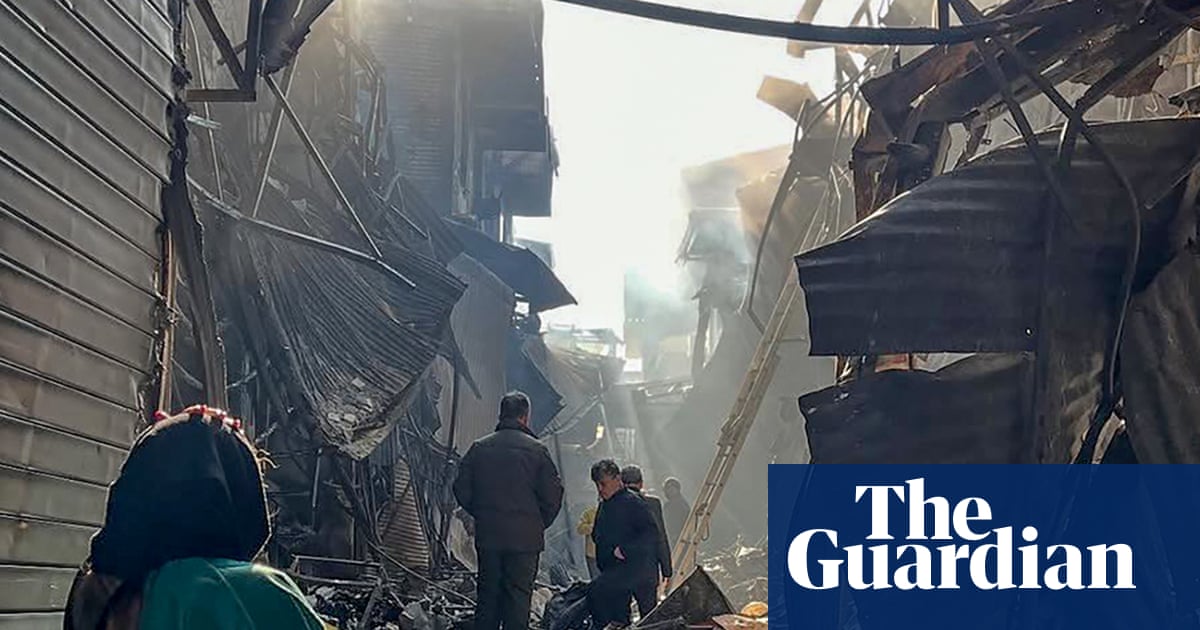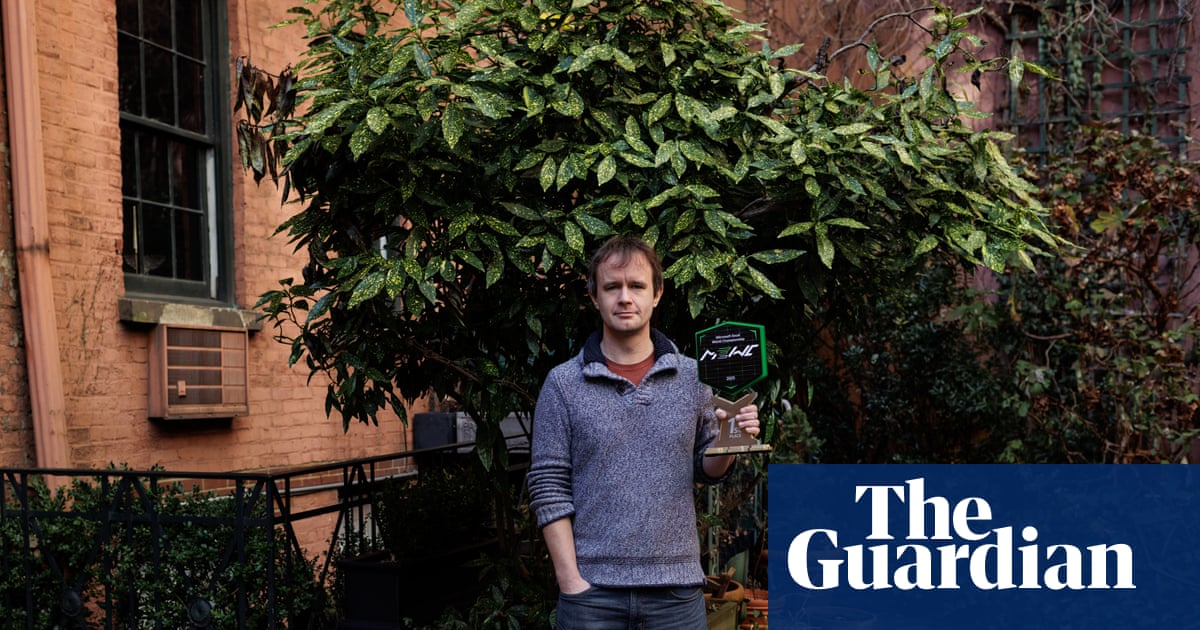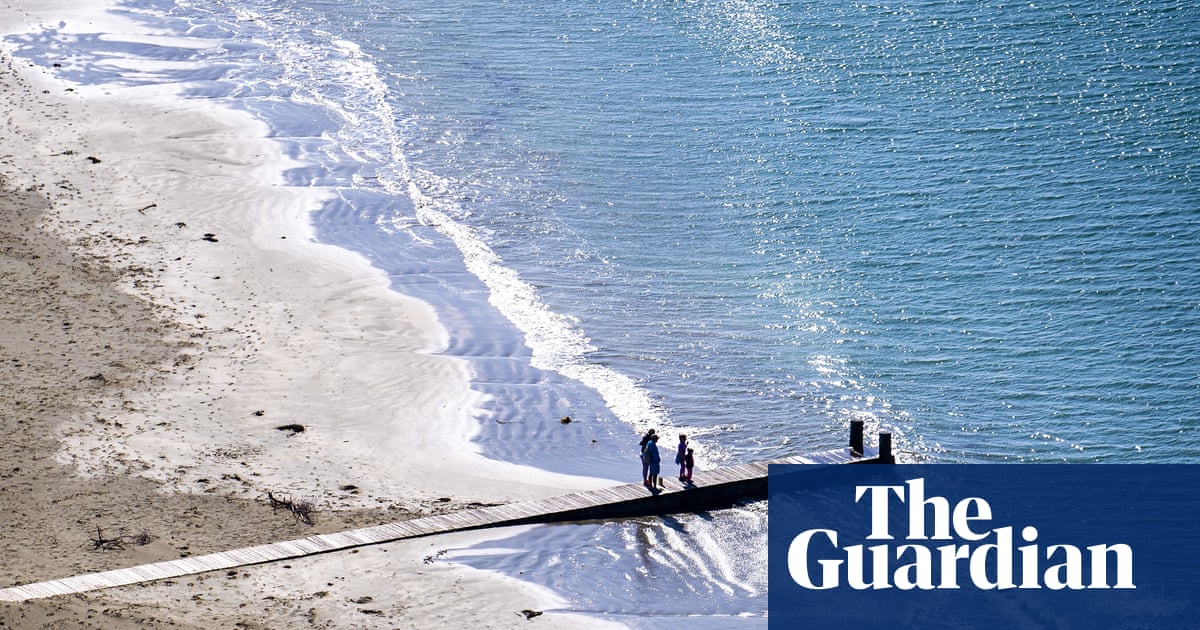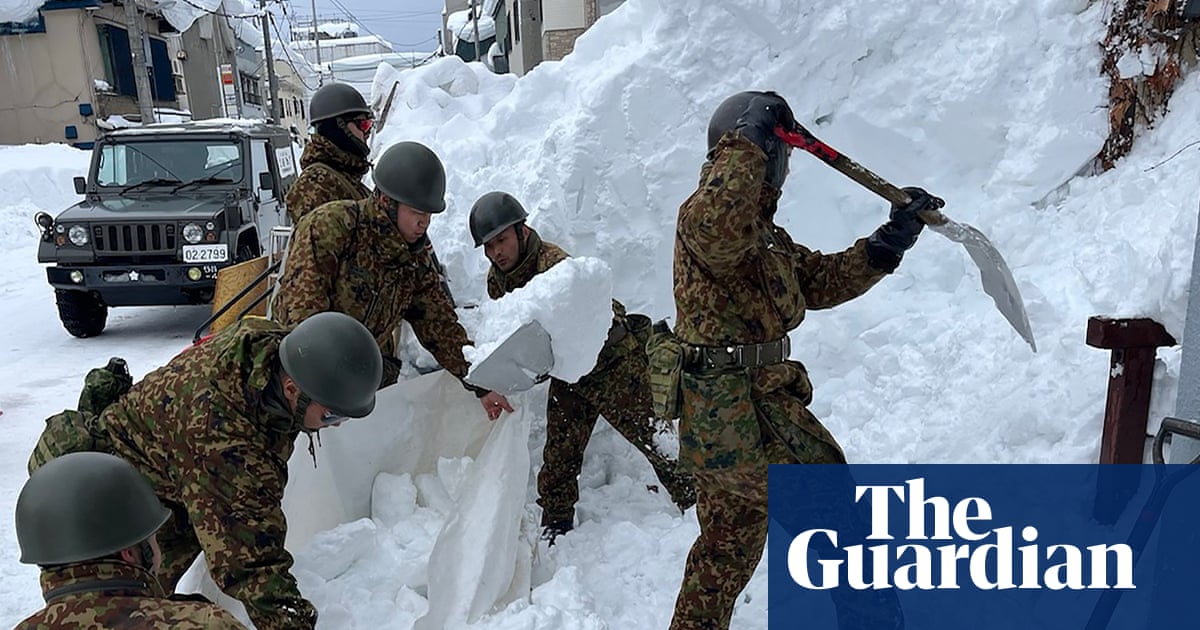José Bertin Cruz-Estrada was responding to a wildfire in Washington state on 27 August when four unmarked vehicles drove up to his crew’s remote location in a national forest.
Cruz-Estrada, part of a team of 20 Oregon-based firefighters, had spent a week hiking through dense terrain, battling smoke and clearing fallen trees and other debris to prevent the Bear Gulch fire, a 9,000-acre blaze, from growing. That morning, they were waiting for a taskforce leader to provide instructions, but Cruz-Estrada quickly realized the men arriving in trucks were not emergency responders.
They were US border patrol agents.
The armed officers surrounded the firefighters, directing them to line up while agents checked IDs. Officers “cleared” the crewmembers one-by-one until they got to Cruz-Estrada, 35, who they said was under arrest. The agents handcuffed him and another firefighter and drove the two away from the forest, where the fire was only 13% contained.
“I felt betrayed. We were fighting fires deep in the forest. I never thought this could happen,” recalled Cruz-Estrada, a longtime Oregon resident, who was born in Mexico and is undocumented.
Cruz-Estrada has worked as a firefighter since 2019 and for years, has also run a successful landscaping business that he grew from scratch, making him beloved by many in his local community, including his town’s mayor.
The arrests sparked widespread outrage, as natural disasters were long considered off limits for immigration enforcement. Activists celebrated when, four weeks later, Rigoberto Hernandez Hernandez, the other detained immigrant firefighter, was freed and returned home to Oregon.
Cruz-Estrada, however, remained locked up. And at the end of October, after two months of detention, he was quietly deported to Mexico.
Now separated from his 14-year-old son, his mother and two brothers, Cruz-Estrada is speaking out for the first time, questioning why the US government targeted him on the job, after years of public service.
“What if it was the [border patrol] officers’ house that was on fire? Would they still arrest me or would they let me do my job? I’m not a criminal, I’m a professional. We’re supposed to be brothers – officer to officer. It’s backstabbing.”
‘Oregon is home’
“Oregon is home,” Cruz-Estrada said in a video call with the Guardian one week after his deportation. He was deported to a border city, but asked to keep his location in Mexico private due to safety concerns. “Oregon is where I grew up, where I went to school, where I had my first girlfriend.”
Cruz-Estrada left Mexico in 2003 at age 12, he said, first briefly living in Omaha, Nebraska. His single mother had already brought his younger brother to the US for medical treatment, and Cruz-Estrada and his older brother were joining them, he recalled: “It wasn’t our decision. We just wanted to be with mom, and she wanted her kids together.”
The family soon relocated to Independence, Oregon, a city outside the state capital of Salem.
His mother worked as a wildland firefighter for several years when he was young, he said, sparking his interest: “She was my hero.” She also encouraged him to spend time outdoors, and as an older teenager, Cruz-Estrada did forest thinning jobs and worked at a Christmas tree farm: “My love for the forest started early.”
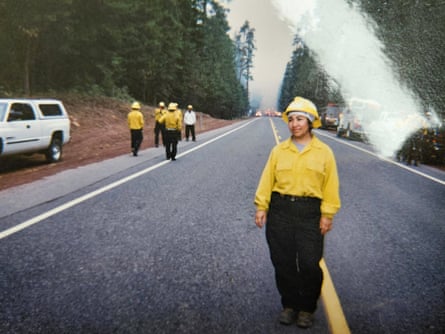
In 2011, at age 20, Cruz-Estrada had a son and began pursuing a firefighting career.
But in 2013, he got caught up in the criminal legal system after a local drug bust. Officers, records show, were not focused on Cruz-Estrada, but rather a resident of a home where Cruz-Estrada was hanging out. An informant bought drugs from the resident and secretly filmed the encounter; police accused Cruz-Estrada of being a “lookout”, because he was seen leaving the home and “walking around the surrounding area”, a prosecutor wrote.
Cruz-Estrada was charged with a litany of serious offenses, including racketeering and unlawful delivery of methamphetamine, but the charges were dismissed in exchange for him pleading guilty to one count of conspiracy to deliver meth, a charge stemming from the “lookout” allegations.
The conviction carried no prison time. Cruz-Estrada says now that law enforcement had no evidence to tie him to more serious drug charges and was simply targeting him because he was caught at the location during the bust. But because he was not a US citizen, the record made him eligible for removal and he was deported to Mexico that year.
“It was devastating. I had a baby son,” said Cruz-Estrada, who tried returning to the US in 2015, but was again removed. He returned once more, without authorization, in 2019, and though he was undocumented, he began rebuilding his life in Oregon.
‘I wanted to make a positive impact’
Back in Oregon, Cruz-Estrada worked at a junkyard, helped a high school friend’s landscaping business and started working for a private firefighting company that contracts with the government. He used savings from firefighting to purchase a lawnmower, weedwacker, leaf blower and trimmer – enough tools to start his own landscaping work.
“I wanted to be able to provide a service to my community … I didn’t want to go back to my old habits, my old friends,” he said. He strived to prove he was not the same person whose name was blasted a decade prior in news stories about a major drug bust: “I wanted to make a positive impact and be recognized.”
He formally incorporated his lawn care business in 2022, building his client base through word-of-mouth.
He also rose in the ranks as a firefighter, from crewmember to squad boss and incident commander, helping instruct trainees and working as a sawyer, directing crews doing hazardous tree removals. “I always had a leadership mentality, and always raised my hand for the hardest challenges ... I felt like I belonged in the forest.”
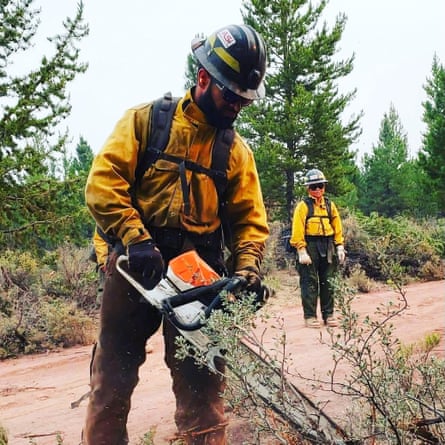
His firefighting company sent him to a range of disasters, including a major 2020 fire in Oregon, the largest-ever New Mexico wildfire in 2022, and Hurricane Helene in Alabama last year.
As he recently prepared to deploy to Washington, Cruz-Estrada was feeling hopeful about his future. The Better Business Bureau had just accredited his landscaping firm, a major boost to his business.
The Bear Gulch fire was the largest in more than 70 years in Washington’s Olympic Peninsula, and Cruz-Estrada spent roughly six days hiking through rough terrain, clearing brush and debris and targeting hotspots where the fire could reignite.
Before his arrest, incident commanders directed his team to go to a staging area within the fire zone, saying they would be cutting wood, which he and others said seemed like an unusual assignment while the fire remained so uncontained.
When border patrol arrived, the agents parked their vehicles to block the exit route, a dangerous maneuver that went against best practices to ensure easy access to escape, Hernandez, the other detained firefighter, wrote in a declaration. The agents declined to disclose their names or show badges, failed to produce warrants and laughed at Hernandez when he said he was exercising his right to remain silent, he said.
While Hernandez was handcuffed, he heard a border patrol agent compare immigrants to a bunch of “stray cats” that required “animal control”, he wrote. The two firefighters were driven away to a border patrol station where, the declaration said, they remained for a day in a cold cell with no beds or soap.
‘Arresting first responders … is a terrible idea’
Detained at the Immigration and Customs Enforcement (ICE) processing center in Tacoma, Washington, Cruz-Estrada worried about his family and clients left behind.
He’d planned to take his son back-to-school shopping when he returned from the fire. “It’s traumatizing,” he said. “Having kids, it’s like a piece of you. That’s being taken away from me.”
As word spread about the arrests, Democrats demanded answers. Patty Murray, US senator from Washington, said it was “as immoral as it is dangerous” to detain firefighters, calling Trump’s immigration policies “fundamentally sick”.
Under previous administrations, including in Trump’s first term, the Department of Homeland Security (DHS) has repeatedly emphasized that it would not conduct routine immigration enforcement during weather emergencies. Scott Shuchart, a former senior ICE official under Joe Biden, said the practice was meant to ensure people could safely follow orders, seek law enforcement help and access shelters.
Targeting a wildfire was part of the Trump administration’s strategy of “broad and indiscriminate” detentions with little care for public safety concerns, he said. “Arresting first responders fighting a fire is a terrible idea, just like setting up an immigration checkpoint on an evacuation route. There are things that are more important than civil enforcement, including life and preventing major damage to property.”
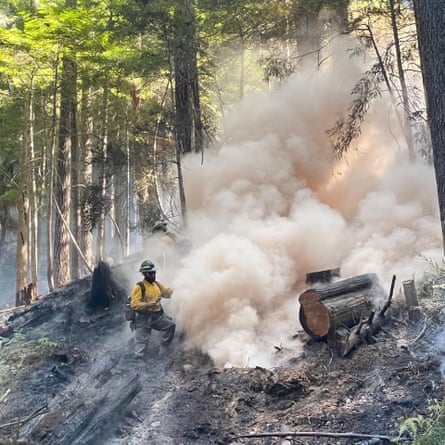
Border patrol said in a statement in August it was assisting the US Bureau of Land Management (BLM) and Forest Service in a federal investigation of two firefighting firms with government contracts, including ASI Arden Solutions, which employed Cruz-Estrada. The agency said it discovered “discrepancies” while “verifying the identities of the contracted personnel”, leading to the arrests of the two men for unlawful entry. Border patrol “did not interfere with firefighting operations or the response to any active fires in the area”, the agency said.
A BLM spokesperson said in an email the bureau was investigating “potentially significant timecard fraud on the part of contract fire crews” and during the process discovered that some crewmembers were working under visas. BLM then contacted US border patrol to “conduct visa verifications”, which led to the arrests. The spokesperson said the Forest Service terminated the firms’ federal contracts and that it was “an ongoing investigative matter”, declining to comment further.
ASI did not respond to inquiries. A Forest Service spokesperson said it was “aware of a border patrol operation” and it was “standard practice to cooperate with all law enforcement investigations and operations when requested”, declining to comment further.
DHS published a photo of Cruz-Estrada in its press release and accused journalists of “false reporting”, claiming the targeted crews were not actively firefighting, but there in a “support role”: “The media’s ‘firefighters’ were actually criminal illegal aliens.” DHS noted Cruz-Estrada had previously been deported, saying his criminal records “include the delivery and selling of methamphetamine”. The statement failed to acknowledge he was not convicted of delivery and selling meth, but rather a conspiracy charge.
Cruz-Estrada said he had more than paid his dues for his 12-year-old criminal case: “What will it take for me not to be labeled as the bad guy anymore? Yes, I was involved with the wrong people in 2013, but it was one mistake and I had worked through the years to better myself as a father, as a son, as a representative for my business, and as a member of my community.”
Attorneys for Hernandez, the 23-year-old firefighter who was also detained, said border patrol had no reasonable suspicion to question him and had violated his due process rights and noted he had a pending application for a visa for crime victims. He was released while his federal lawsuit is ongoing.
“I felt happy for him and his family,” said Cruz-Estrada, who had trained Hernandez. “I was like: ‘Go, escape this place, and I hope to see you soon.’ I really hoped the same would happen for me.”
Cruz-Estrada, however, was not eligible for asylum due to his past deportation, but sought relief under the convention against torture, based on his fears about the threats of violence, including from cartels, he said. A judge nonetheless ordered him deported.
In an email, Tricia McLaughlin, DHS assistant secretary, repeated the department’s claims that Cruz-Estrada and Hernandez were not “responding to any active emergency” and the “firefighting response remained uninterrupted”. She said border patrol had “encountered” Cruz-Estrada 15 times over the years and again cited his past criminal charges without noting they were dismissed. “Once again, the Guardian is debasing itself by peddling sob stories from a criminal illegal alien … Stop publishing criminal illegal aliens’ testimonies as the truth.”
Border patrol did not respond to inquiries.
‘It hit people really hard’
News of Cruz-Estrada’s detention and deportation caused alarm across his community in Monmouth, Oregon, the city adjacent to Independence where he grew up.
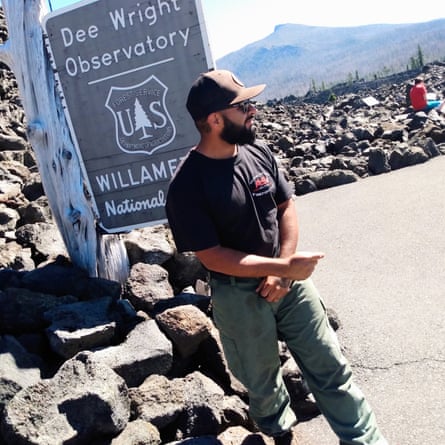
“It hit people really hard,” said Cecelia Koontz, Monmouth’s mayor, who had for years hired Cruz-Estrada to do landscaping work at her home, and who said she was speaking in her personal capacity. “He does such a great job and cares so much about his work and is super responsible. So people respected that and were horrified when he was detained.”
Cruz-Estrada often felt bad when he had to leave town for a wildfire and couldn’t do landscaping, Koontz recalled: “He was always so concerned about his customers, but I’d say, no, what you’re doing is so important. He took great pride in his business.”
His removal, she said, has helped some conservatives in her area grasp that the deportations were not, as the Trump administration has claimed, targeting “the worst of the worst”. “You read the names and see the stories in the paper, but people don’t think it would happen to somebody in a small town like Monmouth.”
Cruz-Estrada hopes to reunite with his family and return home to Oregon, but doesn’t know how or when that might be possible.
“It’s like one day you have a home and a life, and suddenly, you’re not there anymore, you’re in a whole different habitat, wondering, what am I going to do now?”

 2 months ago
63
2 months ago
63


